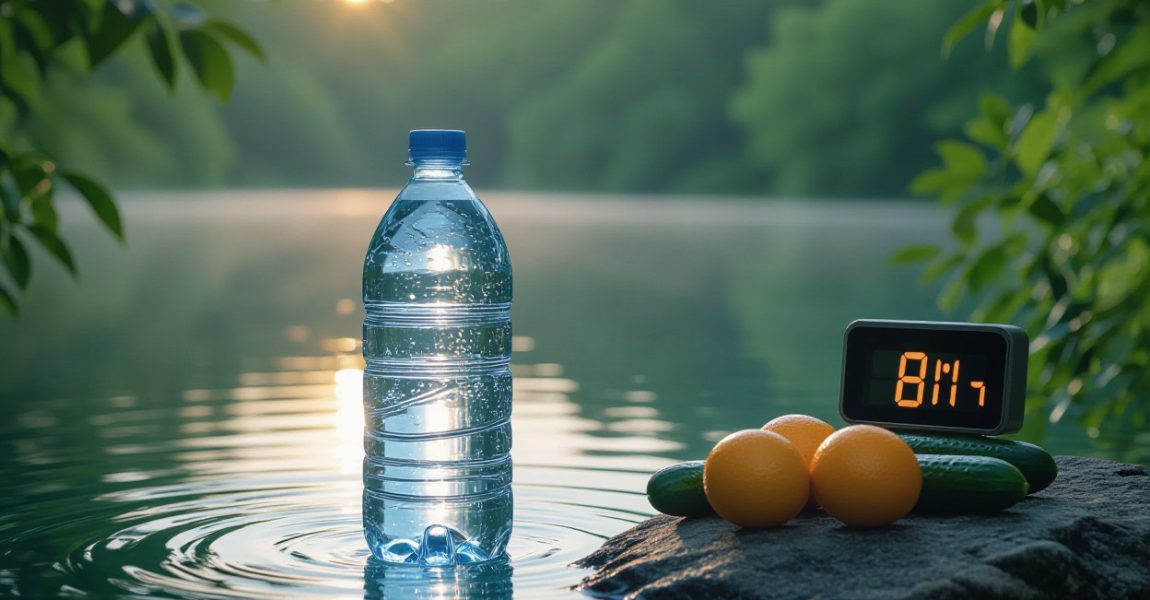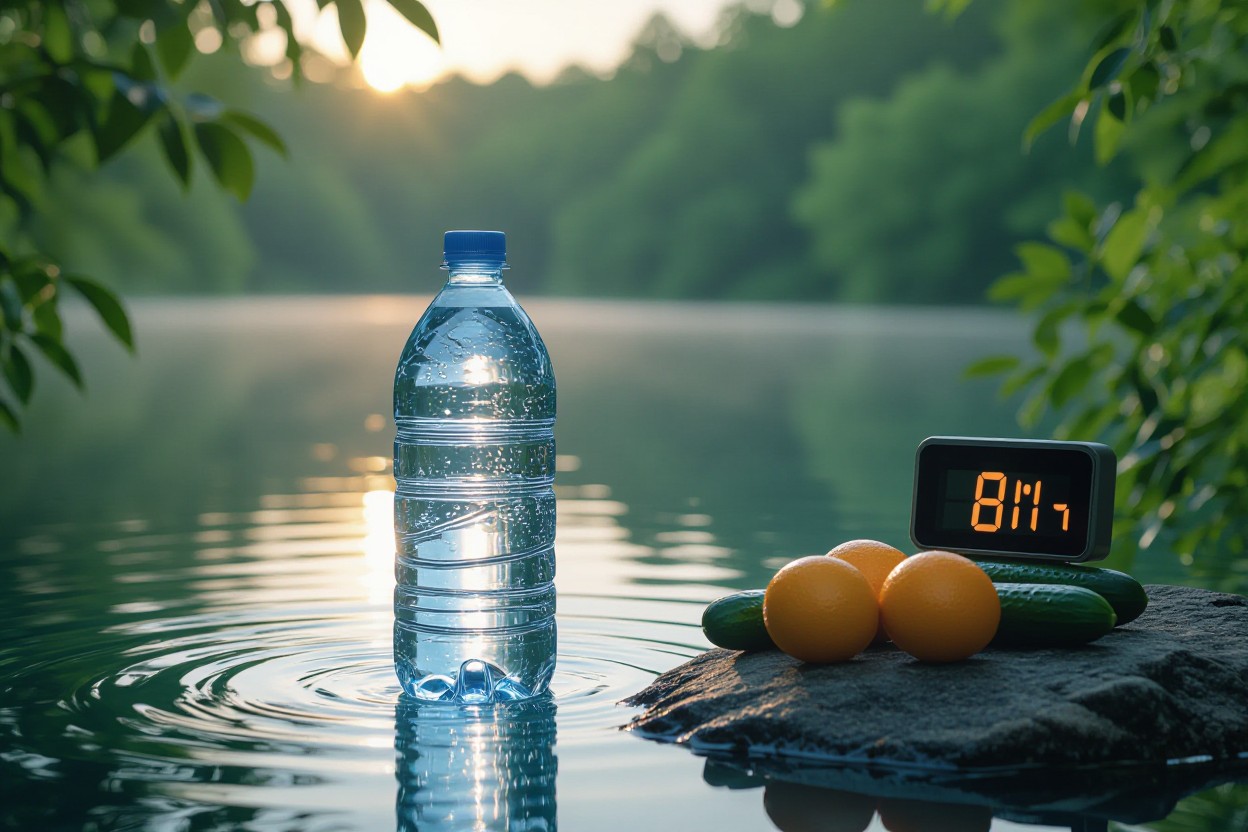
Many people think drinking water is simple, but knowing the best times to hydrate can significantly impact your health and energy levels. By aligning your water intake with your body’s natural rhythms, you can improve digestion, boost metabolism, and even enhance mental clarity. However, drinking water at the wrong times might cause discomfort or dilute imperative stomach acids, hindering absorption. In this post, you will discover 7 surprising facts that help you optimize your hydration habits for maximum benefit throughout your day. Stay refreshed effortlessly with our sleek water dispenser — instant access to clean, hot or cold water at the touch of a button!
Contents
- 1 The Morning Hydration Miracle: Why Your First Drink Matters
- 2 Timing Water Intake for Optimal Workout Performance
- 3 The Midday Hydration Strategy: Combatting Afternoon Slumps
- 4 Evening Hydration: Balancing Needs Without Interrupted Sleep
- 5 Cultural Insights: Global Perspectives on Water Drinking Habits
- 6 To wrap up
- 7 FAQ
- 7.0.1 Q: What is the best time to drink water in the morning?
- 7.0.2 Q: Should I drink water before, during, or after meals?
- 7.0.3 Q: Is it beneficial to drink water before going to bed?
- 7.0.4 Q: How does drinking water throughout the day impact energy levels?
- 7.0.5 Q: Can drinking water at specific times enhance weight management?
Key Takeaways:
- Drinking water first thing in the morning helps activate internal organs and flush out toxins.
- Consuming water about 30 minutes before meals can aid digestion and prevent overeating.
- Staying hydrated throughout the day supports energy levels and cognitive function.
- Drinking water after a workout helps replenish fluids lost through sweat and speeds recovery.
- Hydrating before bedtime, but not too much, can prevent nighttime dehydration and improve sleep quality.
- Consistent small sips of water are more effective than large amounts at once for maintaining hydration.
- Avoid drinking excessive water immediately before or during meals to prevent diluting digestive juices.

The Morning Hydration Miracle: Why Your First Drink Matters
After several hours of sleep, your body wakes up in a state of mild dehydration due to continuous breathing and lack of fluid intake. When you drink water first thing in the morning, you effectively jumpstart your internal systems, replenishing lost fluids and setting a positive tone for your hydration throughout the day. This initial drink acts like a natural flush, aiding in detoxification by helping your kidneys clear out accumulated toxins that have built up overnight.
Many people overlook this moment, but scientific studies reveal that consuming water early in the day can improve both mental clarity and physical energy. For example, research from the University of East London found that mild dehydration impairs your ability to concentrate, so drinking water right after waking up can sharply improve cognitive performance and mood. Hydrating promptly upon arising supports not just your body, but your brain’s optimal functionality as well.
The Benefits of Water Upon Waking
Drinking water first thing increases your hydration status from the moment you get up. This supports smoother digestion and helps relieve common issues like acid reflux or constipation by stimulating the gastrointestinal tract to prepare for digestion. You also activate your body’s natural metabolic processes simply by fueling cells after fasting all night—water is necessary to every chemical reaction happening inside you.
Furthermore, cold water in particular can stimulate thermogenesis—a process where your body burns more calories to warm the liquid—thus giving metabolism a gentle boost. Drinking about 500ml of water within the first 30 minutes after waking can increase your resting energy expenditure by up to 30% for roughly an hour, a finding supported by a 2003 study published in The Journal of Clinical Endocrinology and Metabolism.
How Hydration Influences Metabolism
Your metabolic rate depends heavily on optimal hydration, as water is required for all cellular activities including nutrient breakdown and energy production. Dehydration, even when slight, can slow down the metabolic process and signal your body to conserve energy instead of efficiently burning calories. Drinking water at strategic times, starting with the morning, helps maintain this delicate balance.
Additionally, hydration affects your body’s ability to regulate blood glucose levels and insulin sensitivity, key factors in how effectively your metabolism processes energy from food. Consistent water intake supports these mechanisms, potentially reducing risks of metabolic dysfunction and weight gain in the long term.
Further exploring this, studies indicate that ensuring you are properly hydrated can enhance the performance of mitochondria—the “powerhouses” of your cells—thereby improving energy production at the cellular level. This microscopic boost translates into higher overall metabolic efficiency, giving you better endurance and stamina throughout the day. Incorporating adequate hydration into your morning routine sets the foundation for all these benefits to unfold naturally.
Timing Water Intake for Optimal Workout Performance
Hydration Before Exercise: Why It Matters
Drinking water before you start your workout can significantly impact your performance and endurance. Research shows that consuming about 16 to 20 ounces of water two hours before exercise helps ensure your body is well-hydrated at the outset. This pre-exercise hydration prevents the early onset of fatigue and can delay dehydration symptoms such as dizziness or muscle cramps during your session.
A study involving endurance athletes found that starting exercise in a hydrated state allowed participants to perform at higher intensities for longer periods. Additionally, drinking smaller amounts, like 7 to 10 ounces, about 10 to 20 minutes before you begin can top off hydration levels without causing discomfort or the need for a bathroom break shortly after starting.
The Post-Workout Window: Replenishing Effectively
After intense physical activity, your body needs to recover lost fluids and electrolytes quickly. Drinking water immediately after your workout—ideally within 30 minutes—can accelerate the rehydration process and help maintain muscle function. The amount you drink should reflect the volume lost through sweat, which is about 16 to 24 ounces for every pound of body weight lost during exercise. Pairing water with electrolyte-rich drinks or snacks also assists in restoring balance, especially if your workout was particularly long or sweaty.
Post-workout hydration is not just about fluid replacement; it also supports nutrient delivery to muscles, facilitating repair and growth. In fact, one study showed that athletes consuming water alongside carbohydrates post-exercise had improved glycogen replenishment compared to those hydrating with plain water only.
If you’ve engaged in a lengthy or rigorous session, monitoring urine color can provide insight into your hydration status. A pale, straw-like color typically indicates adequate hydration, while darker urine suggests you need to keep drinking. Balanced rehydration strategies that incorporate both water and electrolytes optimize recovery, reduce muscle soreness, and prepare you for your next workout with improved stamina.
The Midday Hydration Strategy: Combatting Afternoon Slumps
By the time the afternoon hits, many people encounter a noticeable drop in energy and focus, commonly known as the afternoon slump. One effective method to counteract this dip involves scheduling intentional water intake during the midday hours. Drinking water around lunchtime and shortly afterward helps maintain optimal hydration, which sustains cognitive function and sustains your body’s natural energy production. This strategy not only combats fatigue but also refreshes your mental sharpness, making it easier to power through the rest of your day.
Incorporating water consumption into your midday routine encourages better metabolic function. Studies have shown that even mild dehydration can reduce concentration and increase feelings of tiredness. When you target hydration in the early afternoon, you sustain blood volume and support efficient nutrient delivery to brain cells. Implementing a systematic approach to hydrating can be a simple yet powerful way to maintain your productivity and mood, especially when your workload intensifies.
The Science Behind Dehydration and Energy Levels
Dehydration impacts your body’s energy levels by influencing how efficiently cells generate energy. Mild dehydration of as little as 1 to 2% of body weight can lead to decreased alertness, impaired memory, and greater perception of effort during physical activity. When your brain cells do not receive adequate water, neuron function slows down, disrupting neurotransmitter balance vital for keeping you alert.
Moreover, dehydration causes your blood to thicken, forcing your heart to work harder to pump oxygen and nutrients throughout the body. This extra strain quickly leads to fatigue. Scientific evidence confirms that consistent hydration benefits energy metabolism by maintaining blood volume, regulating temperature, and enabling enzymes responsible for energy production to function optimally.
Tips for Remembering to Hydrate at Work
Setting up specific cues throughout your workday can significantly improve your adherence to a hydration schedule. Placing a water bottle within your arm’s reach acts as a visual reminder and eliminates excuses to delay drinking. Try syncing sips with routine tasks—every time you finish reading an email, take a few drinks of water. Incorporating hydration breaks into your calendar as reminders also helps build a steady intake habit.
Choosing flavored water or infusing your bottle with fruit slices can add variety that keeps your interest intact. Some people find using apps designed for hydration tracking boosts compliance by providing notification nudges and goal tracking. You might also pair hydration moments with stretching or short walks away from your desk to reinforce positive health behaviors.
More effective strategies involve creating an environment that naturally prompts your midday hydration. Position a water bottle near your keyboard or dinnerware area, keep a glass on your desk, and utilize digital alarms at regular intervals to prompt water consumption. Maintaining a log or an app-based tracker can reveal trends and help you increase intake over time. Recognizing these small adjustments can transform hydration from an overlooked task into an integral part of your workday routine.
- Keep a water bottle visible: Visual cues encourage frequent drinking without conscious effort.
- Pair drinking with routine tasks: Linking hydration with habitual activities builds automatic behavior.
- Use hydration apps: Notifications and tracking maintain motivation and accountability.
- Add flavor: Enhance water’s appeal by infusing fruits to prevent monotony.
- Schedule reminders: Digital calendars or alarms help maintain regular intervals.
- Hydration consistency: Establish ongoing rituals tied to your daily work rhythm.
- Cognitive and energy benefits: Staying hydrated reduces afternoon fatigue and mental fog.
- Ergonomic placement: Keep water close to workstation to eliminate barriers.
Recognizing how integrating these strategies into your workflow can maintain hydration and energy will equip you to tackle afternoon challenges more effectively.
Evening Hydration: Balancing Needs Without Interrupted Sleep
How Evening Water Intake Affects Sleep Quality
Drinking water in the evening can impact your sleep patterns in several ways. If you consume large quantities too close to bedtime, your body may trigger frequent awakenings due to the need to urinate, known as nocturia. Studies indicate that up to 20% of adults experience sleep disruption because of nighttime urination. This interruption fragments your sleep cycles, reducing the time spent in restorative deep and REM stages, which are key for cognitive function and overall health.
On the other hand, not hydrating enough in the evening can lead to dehydration by the time you wake up, making you feel groggy or lightheaded. Research shows that even mild dehydration can impair attention and memory. Your body continues to lose fluids throughout the night via respiration and perspiration, so completely avoiding liquids before bed can leave you at a deficit come morning.
Finding the Right Balance Before Bedtime
To avoid disruptions while still maintaining hydration, aim to adjust your water intake and timing thoughtfully. Drinking moderate amounts of water about 1 to 2 hours before sleeping gives your kidneys enough time to process excess fluids, minimizing the chance of nighttime bathroom visits. For example, sipping around 150 to 250 milliliters during this window can help maintain hydration without overburdening your bladder.
Additionally, the quality of your evening hydration depends on the types of fluids you consume. Avoid overly caffeinated or alcoholic beverages, as these increase urine production and can further impair sleep quality. Instead, opt for plain water or herbal teas to gently hydrate your system.
Another approach involves monitoring your body’s signals closely. If you find yourself waking multiple times during the night to urinate, consider reducing the evening water intake slightly and see if symptoms improve. Adjusting your hydration habits gradually allows you to identify the perfect balance that supports both your hydration needs and undisturbed sleep.
Cultural Insights: Global Perspectives on Water Drinking Habits
Unique Rituals and Practices from Around the World
Explore how Japan’s tea culture emphasizes sipping water or warm tea in carefully measured amounts throughout the day to promote harmony and balance in your body. This slow, mindful approach contrasts sharply with the hurried gulps often seen elsewhere and contributes to better digestion and hydration. In parts of India, you might find people drinking water from copper vessels first thing in the morning, a practice believed to offer antimicrobial benefits and improve digestion due to copper’s natural properties. These traditions demonstrate how hydration rituals do more than quench thirst—they interweave with cultural beliefs surrounding health and well-being.
In the Mediterranean, the habit of drinking water slowly alongside meals rather than before could change your hydration habits in surprising ways. People there believe that gulping water before eating can dilute digestive enzymes, while sipping water during or after meals helps with digestion and nutrient absorption. Meanwhile, in some Middle Eastern countries, tea infused with herbs is counted toward daily hydration but also serves as a social bonding experience, highlighting how water consumption often intersects with social norms and lifestyle.
What We Can Learn from Different Cultures
You can borrow several lessons from global water drinking customs to enhance your own hydration strategy. The Japanese method encourages you to hydrate steadily, avoiding dehydration or the uncomfortable bloating that can come from drinking too much water too quickly. Meanwhile, the copper water practice suggests that the vessel you use might add certain health benefits beyond just the H2O inside. These small tweaks, grounded in centuries-old traditions, offer practical insights into how to optimize hydration with more mindfulness and potentially greater health benefits.
Adopting a cultural mindset that values the timing and manner of water intake could help you rethink your hydration schedule. For instance, pacing your water intake instead of consuming large amounts all at once might improve both your energy levels and digestion. Similarly, pairing hydration with social or mindful routines, much like traditions found in the Middle East or Japan, creates consistent habits that make it easier for you to stay well-hydrated throughout the day.
Expanding on these cross-cultural practices reveals that hydration isn’t merely about volume; it’s about harmony with your body’s rhythms and environment. Whether it’s sipping water in small quantities or the choice of drinking vessel, each element holds potential benefits. You can enhance your daily hydration not just by how much water you drink, but by adopting certain rituals that influence digestion, social connection, and even your mental approach to wellness. This broad perspective encourages a more holistic view of hydration tailored to your lifestyle and body’s needs.
To wrap up
Taking this into account, you can see that understanding the best times to drink water during the day can significantly enhance your hydration and overall well-being. By aligning your water intake with specific times—such as after waking up, before meals, and during physical activity—you support your body’s natural rhythms and optimize digestion, energy levels, and cognitive function. These surprising facts highlight that timing matters just as much as quantity when it comes to staying properly hydrated.
As you apply this knowledge to your daily routine, you may notice improvements in your alertness, metabolism, and even skin health. By paying attention to your body’s signals and incorporating strategic hydration moments, you empower yourself to maintain better health and energy throughout the day. This personalized approach to drinking water ensures that you get the most benefit from each glass, enhancing your vitality in ways you might not have expected.
FAQ
Q: What is the best time to drink water in the morning?
A: Drinking water first thing in the morning helps kickstart your metabolism and rehydrates the body after several hours of sleep. It can also aid in flushing out toxins and improving digestion throughout the day.
Q: Should I drink water before, during, or after meals?
A: Drinking water about 30 minutes before meals can improve digestion by preparing your stomach. Sipping small amounts during meals is okay, but avoid drinking large quantities as it can dilute digestive juices. Drinking water after meals helps with nutrient absorption and keeps you hydrated.
Q: Is it beneficial to drink water before going to bed?
A: Drinking a small glass of water before bedtime can be beneficial for hydration overnight. However, avoid drinking large volumes to prevent frequent trips to the bathroom that can disrupt sleep.
Q: How does drinking water throughout the day impact energy levels?
A: Consistent hydration is key to maintaining energy and concentration. Drinking water at regular intervals, such as every hour, helps prevent fatigue and supports brain function by keeping cells well-hydrated.
Q: Can drinking water at specific times enhance weight management?
A: Yes, drinking water before meals can promote a feeling of fullness, potentially reducing calorie intake. Also, staying hydrated supports metabolism, which can assist in weight management efforts.
- August 1, 2025
- Benefits
